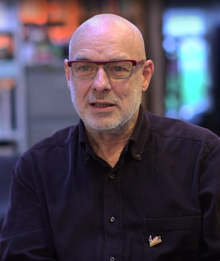Brian Eno | |
|---|---|
 Eno in 2015 | |
| Born | Brian Peter George Eno 15 May 1948 Melton, Suffolk, England |
| Other names |
|
| Occupations |
|
| Years active | 1970–present |
| Spouses | Sarah Grenville
(m. 1967, divorced)Anthea Norman-Taylor
(m. 1988) |
| Children | 3 |
| Relatives | Roger Eno (brother) |
| Musical career | |
| Genres | |
| Instruments | |
| Discography | Brian Eno discography |
| Labels | |
| Formerly of | |
| Website | brian-eno |
Brian Peter George St John le Baptiste de la Salle Eno[† 1] (/ˈiːnoʊ/; born 15 May 1948), also mononymously known as Eno, is an English musician, songwriter, record producer and visual artist. He is best known for his pioneering contributions to ambient music and electronica, and for producing, recording, and writing works in rock and pop music.[2] A self-described "non-musician", Eno has helped introduce unconventional concepts and approaches to contemporary music.[2][3] He has been described as one of popular music's most influential and innovative figures.[2][4] In 2019, he was inducted into the Rock and Roll Hall of Fame as a member of Roxy Music.[5]
Born in Suffolk, Eno studied painting and experimental music at the art school of Ipswich Civic College in the mid-1960s, and then at Winchester School of Art. He joined the glam rock group Roxy Music as its synthesiser player in 1971 and recorded two albums with them before departing in 1973. He then released a number of solo pop albums, beginning with Here Come the Warm Jets (1974), and explored minimal music with the influential recordings Discreet Music (1975) and Ambient 1: Music for Airports (1978), with the latter coining the term "ambient music".
Alongside his solo work, Eno collaborated frequently with other musicians in the 1970s, including Robert Fripp (as part of the duo Fripp & Eno), Harmonia, Cluster, Harold Budd, David Bowie, and David Byrne. He also established himself as a sought-after producer, working on albums by John Cale, Jon Hassell, Laraaji, Talking Heads, Ultravox, and Devo, as well as the no wave compilation No New York (1978). In subsequent decades, Eno continued to record solo albums, and produce for other artists, most prominently U2, Coldplay and Peter Gabriel, and including Daniel Lanois, Laurie Anderson, Grace Jones, Slowdive, Karl Hyde, James, Kevin Shields, and Damon Albarn.
Dating back to his time as a student, Eno has also worked in other media, including sound installations, film and writing. In the mid-1970s, he co-developed Oblique Strategies, a deck of cards featuring aphorisms intended to spur creative thinking. From the 1970s onwards, his installations have included the sails of the Sydney Opera House in 2009[6] and the Lovell Telescope at Jodrell Bank in 2016. An advocate of a range of humanitarian causes, Eno writes on a variety of subjects and is a founding member of the Long Now Foundation.[7] His modern political activism has also included Gazan tragedy awareness before[8] and during[9] the 2023-24 Gaza–Israel conflict, climate change awareness,[10][11] anti-Toryism,[12] and the freedom and release of Julian Assange.[13]
- ^ Hattenstone, Simon (23 January 2017). "Brian Eno: 'We've been in decline for 40 years – Trump is a chance to rethink' | Brian Eno". The Guardian. Retrieved 28 August 2024.
- ^ a b c d Jason Ankeny. "Brian Eno | Biography & History". AllMusic. All Media Network. Retrieved 22 November 2017.
- ^ "Brian Eno Biography". Rolling Stone. Retrieved 28 April 2016.
- ^ Steadman, Ian (28 September 2012). "Brian Eno on music that thinks for itself (Wired UK)". Wired UK. Retrieved 29 April 2016.
- ^ "Roxy Music". Rock & Roll Hall of Fame. Retrieved 30 March 2019.
- ^ "ABC news". 19 March 2009. Retrieved 28 December 2019.
- ^ "Projects - The Long Now". Longnow.org. Retrieved 16 January 2018.
- ^ Vijaykumar, Dimple (31 July 2014). "Brian Eno condemns Israeli action in Gaza as 'ethnic cleansing'". The Guardian. ISSN 0261-3077. Retrieved 1 April 2024.
- ^ "Brian Eno: This Is About People Who Believe in Peace vs. People Who Believe in War". Stop the War. Retrieved 1 April 2024.
- ^ "'Capitalism didn't understand community': Brian Eno steps up the climate crisis battle". The Guardian. 15 April 2022. ISSN 0261-3077. Retrieved 1 April 2024.
- ^ Charara, Sophie. "Brian Eno on Why He Wrote a Climate Album With Deepfake Birdsongs". Wired. ISSN 1059-1028. Retrieved 1 April 2024.
- ^ Reed, Ryan (10 December 2019). "Brian Eno Blasts British Conservative Party on New Pre-Election Song". Rolling Stone. Retrieved 1 April 2024.
- ^ Currie, Richard. "Brian Eno's latest composition: A giant Christmas card with Julian Assange on it". Theregister.com. Retrieved 1 April 2024.
Cite error: There are <ref group=†> tags on this page, but the references will not show without a {{reflist|group=†}} template (see the help page).